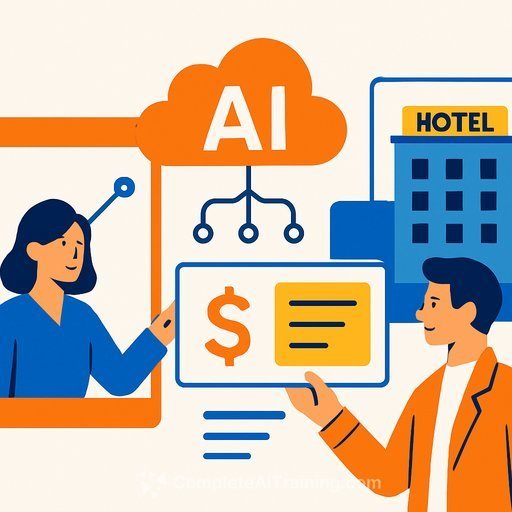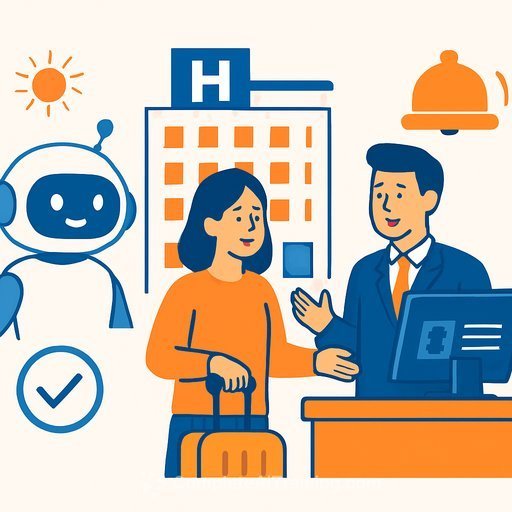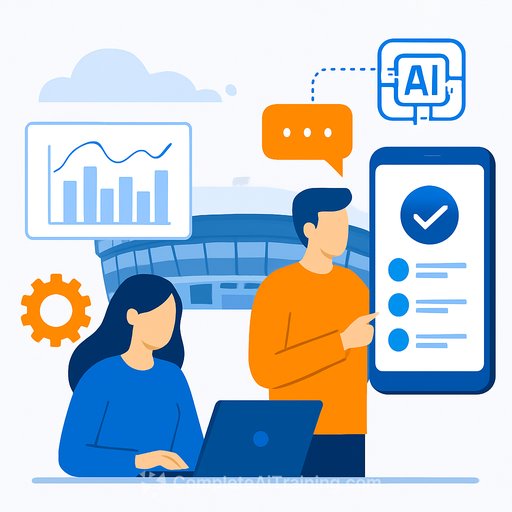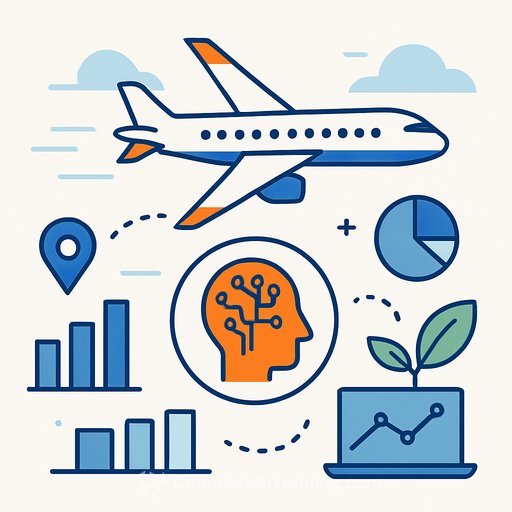AI Checks In: Hotels Monetize Beyond Rooms, Borrowing From Airline Playbooks
Hotels are moving past the room as the main product. AI is stepping in as a digital concierge and quiet salesperson, surfacing upgrades, spa, dining, early check-in, late check-out, and more-at the right moment and price.
This mirrors how airlines price seats, bags, and add-ons. The result: higher spend per stay, stronger loyalty, and less dependence on third-party channels.
Why this matters now
Margins are tight and labor costs are up. AI helps teams present relevant offers without adding headcount, and it does it 24/7 across web, app, chat, email, and on-property touchpoints.
Guests get a smoother stay with offers that make sense for them. Operators get higher ancillary revenue and cleaner data to drive direct relationships.
The algorithmic concierge: how it works
- Predictive analytics for demand and pricing: Models factor in local events, competitor rates, weather, flight arrivals, social sentiment, and historical occupancy to price rooms, upgrades, early check-in, late check-out, spa slots, and more in real time.
- Personalized recommendations: Engines learn from browsing, bookings, loyalty data, and on-property spend. A guest who books spa repeatedly sees relevant packages; a business traveler sees premium Wi-Fi and express services.
- Conversational AI: Chat and voice assistants handle FAQs and surface offers through natural language ("Would you like a 2 pm late checkout for $29?"). They learn preferences with every exchange and escalate to staff when needed.
- Deep CRM integration: Profiles update with behavior and consent, enabling targeted pre-arrival emails, in-stay nudges, and post-stay follow-ups that feel personal, not generic.
What to build: your core setup and data
- Systems: PMS/CRS, CRM or CDP, revenue management for dynamic pricing, recommendation engine, conversational AI, POS and spa/activities systems, payment and voucher issuance.
- Data feeds: Reservations, rate codes, folio spend, web/app events, loyalty tiers, guest preferences, flight/event calendars, weather, competitor pricing, service capacity (spa tables, dining seats), guest feedback.
- Decision logic: Who sees what, at which touchpoint, with guardrails for rate parity, inventory, and service SLAs.
- Consent and identity: Clear opt-ins, preference centers, and ID resolution so messaging stays relevant and compliant.
30/60/90-day rollout plan
- Days 0-30: Baseline KPIs. Map guest journey. Enable web/app/product analytics. Pilot 3 offers (upgrade, early check-in, late check-out) with simple rules. Train front desk to present AI-suggested offers.
- Days 31-60: Turn on dynamic pricing for upgrades and time-bound services. Add a recommendation widget to pre-arrival emails and the booking path. Deploy a chatbot for FAQs plus two revenue intents (upgrade, dining).
- Days 61-90: Feed POS/spa data into CRM. Move from rules to model-driven recommendations. Launch A/B tests on copy, timing, and price elasticity. Expand offers (transport, premium Wi-Fi, experiences).
Metrics that prove ROI
- Ancillary RevPAR and TRevPAR
- Attach rate by product (spa, dining, upgrades, early/late)
- Upgrade take rate and average premium paid
- Chat conversion and deflection (tickets avoided)
- Email/SMS click-to-purchase for pre-arrival and in-stay
- Opt-in rate for personalization and comms
- Direct booking share and repeat stay rate
- CSAT/NPS and recovery time after issues
- Staff hours saved on routine requests
Vendors to watch and how to choose
Incumbents are baking AI into core stacks: Oracle Hospitality, Amadeus, and Sabre. Specialists bring focus: pricing (Duetto, IDeaS), personalization and CRM (Revinate, Guesty), and chat (HiJiffy, Asksuite).
Hotels are asking for connected platforms that cover pre-arrival to post-stay, not isolated tools. Run short proofs of concept with shared KPIs, require open APIs, and insist on data portability. For context on personalization in travel, see this overview from McKinsey here.
Guardrails: privacy, bias, and the human touch
- Consent and transparency: Make opt-ins clear. Let guests control preferences and data use. For a quick reference on data rights, review GDPR basics here.
- Fairness: Test for biased pricing or offer exclusion by segment. Keep an audit trail of model decisions.
- Rate parity and compliance: Respect contracts. Add guardrails to avoid undercutting your own channels.
- Accessibility and escalation: Ensure chat and voice are accessible, with easy handoff to a human.
- Data security: Minimize data, encrypt, and set retention rules. Limit who can view guest profiles.
What's next
- Predictive personalization in the moment: Offers that adjust to weather, delays, or local traffic.
- Voice in room and app: Guests book services, request items, and control amenities hands-free.
- Dynamic packaging: Real-time bundles of rooms, services, and local experiences built for each guest.
- AR/VR previews: Walk-throughs of suites, cabanas, or event spaces before purchase.
- Proactive service recovery: Models flag likely issues and trigger fixes or goodwill credits before complaints land.
Practical playbook for GMs, revenue, and marketing
- Pick three high-margin add-ons and make them bookable across web, app, email, chat, and front desk.
- Feed live capacity to the offer engine (spa, dining, late check-out slots) so you never sell what you can't deliver.
- Start with dynamic upgrade pricing; expand to early/late and high-demand amenities.
- Build a single guest profile with consent and preferences. Use it everywhere.
- A/B test copy, timing, and placement weekly. Keep the winners, retire the rest.
- Train staff on when to step in. AI suggests; humans confirm the moment of truth.
Final take
Hotels are moving from room sellers to experience curators. AI makes add-ons timely, pricing smarter, and service feel personal.
Keep it simple: start with upgrades and time-based services, measure hard revenue, protect guest trust, and expand with proof. If your team needs structured upskilling on practical AI for hospitality roles, explore curated learning paths here.
Your membership also unlocks:






